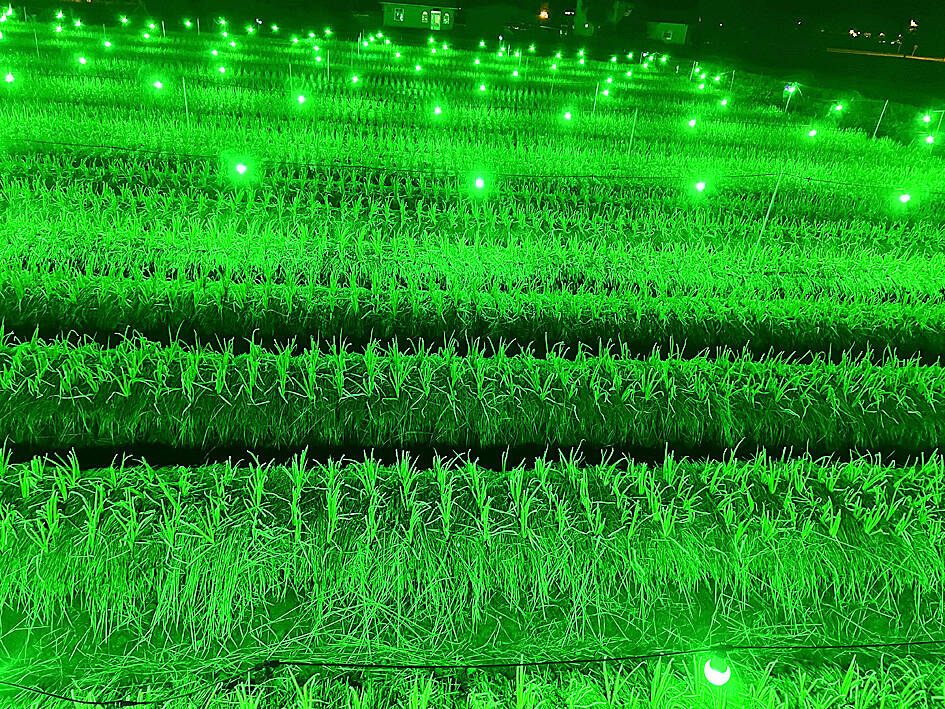A green LED technique has reduced beet armyworm infestations by 40 percent and boosted spring onion production by up to 20 percent, the Taiwan Agricultural Research Institute’s Fengshan Tropical Horticultural Experiment Branch said last week.
Beet armyworms have proliferated across spring onion farmland in Yilan County over the past few years, as climate anomalies led to reduced rainfall in summers, branch director Lee Wen-li (李文立) said.
Spring onion leaves nibbled by beet armyworms have holes or white marks, which seriously decrease their commercial value and cause huge financial losses, Lee said, adding that pesticides are not effective, as the larvae hide in the pipe-shaped leaves.

Photo courtesy of the Taiwan Agricultural Research Institute’s Fengshan Tropical Horticultural Experiment Branch
Lin Tung-hai (林東海), a grower of spring onions based in Yilan County, said that many agricultural workers in Sansing Township (三星) have refrained from planting the crop due to infestations.
“We used to boast 400 hectares [of spring onion planting area], but it is down to 150 hectares,” Lin said.
Branch associate researcher Fang Hsin-hsiu (方信秀), whose work has shown that green LEDs can prevent lychees from being damaged by litchi fruit borers, has also found that beet armyworm could be kept inactive at night by the light, as the larvae are nocturnal, just as the borers are.
The LED technique was applied to green onion farms in Sansing and reduced crop damage by beet armyworms by about 40 percent after three years of experimentation, Fang said.
Branch assistant researcher Lee Hsiang-yi (李香誼) said that the technique boosted production by up to 20 percent.
The technique also reduced pesticide use by 40 percent, Lee Wen-li said.
Although installation of the LED system costs about NT$15,000 per 1,000m2, with higher electricity bills on top of that, the cost is largely offset by reduced expenditure on pesticides, he said, adding that the technique is expected to boost revenue by NT$50,000 per 1,000m2.
The technique could reduce beet armyworm activity by about 50 percent, Lin said, adding that he would consider the investment rewarding as long as the boost in spring onion production covers the costs.
Additional reporting by Chen Wen-chan

Taiwan has received more than US$70 million in royalties as of the end of last year from developing the F-16V jet as countries worldwide purchase or upgrade to this popular model, government and military officials said on Saturday. Taiwan funded the development of the F-16V jet and ended up the sole investor as other countries withdrew from the program. Now the F-16V is increasingly popular and countries must pay Taiwan a percentage in royalties when they purchase new F-16V aircraft or upgrade older F-16 models. The next five years are expected to be the peak for these royalties, with Taiwan potentially earning

STAY IN YOUR LANE: As the US and Israel attack Iran, the ministry has warned China not to overstep by including Taiwanese citizens in its evacuation orders The Ministry of Foreign Affairs (MOFA) yesterday rebuked a statement by China’s embassy in Israel that it would evacuate Taiwanese holders of Chinese travel documents from Israel amid the latter’s escalating conflict with Iran. Tensions have risen across the Middle East in the wake of US and Israeli airstrikes on Iran beginning Saturday. China subsequently issued an evacuation notice for its citizens. In a news release, the Chinese embassy in Israel said holders of “Taiwan compatriot permits (台胞證)” issued to Taiwanese nationals by Chinese authorities for travel to China — could register for evacuation to Egypt. In Taipei, the ministry yesterday said Taiwan

Taiwan is awaiting official notification from the US regarding the status of the Agreement on Reciprocal Trade (ART) after the US Supreme Court ruled US President Donald Trump's global tariffs unconstitutional. Speaking to reporters before a legislative hearing today, Premier Cho Jung-tai (卓榮泰) said that Taiwan's negotiation team remains focused on ensuring that the bilateral trade deal remains intact despite the legal challenge to Trump's tariff policy. "The US has pledged to notify its trade partners once the subsequent administrative and legal processes are finalized, and that certainly includes Taiwan," Cho said when asked about opposition parties’ doubts that the ART was

If China chose to invade Taiwan tomorrow, it would only have to sever three undersea fiber-optic cable clusters to cause a data blackout, Jason Hsu (許毓仁), a senior fellow at the Hudson Institute and former Chinese Nationalist Party (KMT) legislator, told a US security panel yesterday. In a Taiwan contingency, cable disruption would be one of the earliest preinvasion actions and the signal that escalation had begun, he said, adding that Taiwan’s current cable repair capabilities are insufficient. The US-China Economic and Security Review Commission (USCC) yesterday held a hearing on US-China Competition Under the Sea, with Hsu speaking on